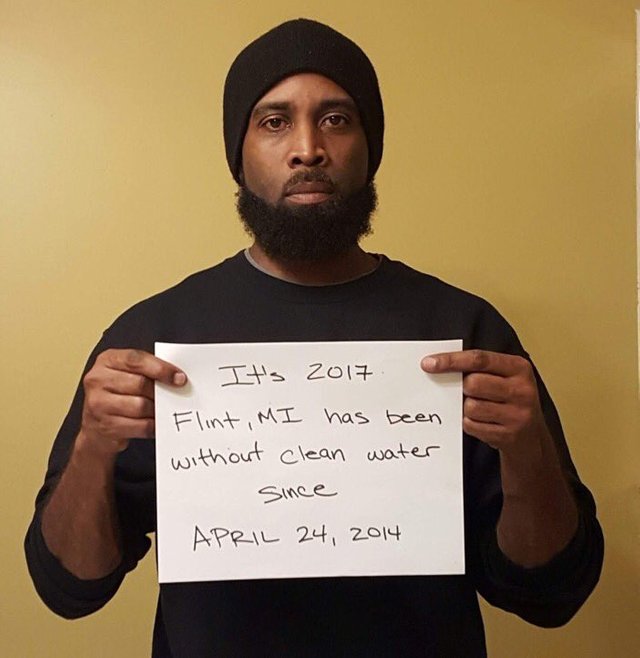Flint Water Token ICO Initial Thoughts
Flint Water Coin


Estimated Cost of Flint Repairs:
$7,500 per house to change water lines.
City funded up to $5000 per home
$2500 per home needed
http://www.mlive.com/politics/index.ssf/2016/10/why_flints_lead_pipe_replaceme.html
$121,860,000 short on repairs, so this is estimated funds needed.
Water Consumption Rates
per capita water use: 80-100 gal/day
Source: USGS
https://water.usgs.gov/edu/qa-home-percapita.html
Population of Flint:
97,386 (and falling)
Source: google top suggested chart, “Sources including US Census Bureau”, August 24, 2017.
48,744 households (2000 census)
Cost of Water
High Price of Water Nationally: $326/month is high for a family of four using 100 gallons per person per day. (Atlanta)
$326 / 4people / 100gal / 30.5 days = $0.02672131148 / gallon
http://www.circleofblue.org/2015/world/price-of-water-2015-up-6-percent-in-30-major-u-s-cities-41-percent-rise-since-2010/
A low cost per gallon (to incentivize early buyers) could be as low as $55 (Memphis)
http://www.circleofblue.org/2015/world/price-of-water-2015-up-6-percent-in-30-major-u-s-cities-41-percent-rise-since-2010/
If we split the difference, aim to pre-sell Flint water tokens at $190.5 (per family of four using 100 gal/day)
This gives us 190 / 4 / 100 / 30.5 = $0.01557377049/gallon
Therefore
At 100/gallons per day, Flint needs 9,738,300 gal/day, while paying as much as $260,220 per day.
Traditional Loan Structure
This repair shortage equal to ~468.3 days of water service fees.
If the lenders got 1/10 of the revenue, it would take 12.8 years to be made whole, much longer if interest were applied.
Alternative, Token Mechanic
If “Flint Water Token” represents a pre-purchase of 1 gallon of water.
Gallons of water could be pre-sold at a moderate modern cost of water.
If we split the difference between high and low water costs, aim to pre-sell Flint water tokens at $190.5 (per family of four using 100 gal/day, similar to the cost of water in Boston)
This gives us 190 / 4 / 100 / 30.5 = $0.01557377049/gallon
That mints $121860000 needed / $0.01557377049/gallon = ~7,824,694,737 tokens
If water prices were comparable with top prices in the country (Seattle, Atlanta), the tokens would be worth $0.02672131148, a potentially 165% return in just over a year. (I can’t tell the future, I’m looking for a way to get water to people).
Funders could be refunded if it was unsuccessful, kickstarter style.
Price Discovery
While holders of the tokens may hope to resell at hugely inflated prices, since the City would still be selling water, the city’s set price would serve as the max-price line, essentially requiring that token holders sell under that price to be competitive in the market.
This would require the initial token price be low enough that it attracts investors, but high enough that it pays for the water infrastructure. To help find this middle-price, an auction mechanic could be used.
First, the city could commit to an initial water price, and only be allowed to adjust that price within certain parameters (at least as long as the tokens are outstanding).
With those price commitments known, there could be a sort of reverse dutch auction, where future gallons of water could initially be sold at over that price, and the price could gradually be lowered, until the target repair cost had been met. (~$121MM).
It’s possible the city would not want to issue tokens below a certain price, say, a tenth of the eventual price of the water, and so would stop the sale at this point.
At this point that the sale was stopped early, the fees could either be refunded to the participants, or maybe the participants could optionally buy the tokens unconditionally.
If the City really had a lower price they were willing to sell at, they might just have the auction approach that price, and not end the sale at all. In this kind of sale, the City might also have the ability to adjust these water-future prices on the fly, so at any time, the minimum sale price for water tokens might go up.
These tokens would probably have some kind of vesting schedule, like they could only be used on homes upgraded with FlintWaterToken funds. Once tokens were vested, and there was a way to spend them, the price of the tokens would have to approach the price of The City’s water, and the city at this point could choose to transition to a tokenized water pricing model, allowing them to sell water futures to help subsidize immediate costs.
Legal Requirements
Getting the City of Flint water district willing to accept these tokens in exchange for clean water service in the future at one gallon per token, and a crowd of people willing to bet some of their savings on people being thirsty in the future.
Depending on the token design, The City would need to be varying degrees of involved.
Sign Up
If you're interested in a Flint Water Coin, and would consider participating, please fill out this quick survey.
Stoked that one of my favorite Twitter follows is on Steem. Also stoked that he leads with this kind of idea. Great to have you here. Upvoted and resteemed.
I think @lukestokes and you will get along great.
Wow, that's a surprisingly kind response. What's your twitter handle?
@eekstheunwise is my pseudonymous one.
Thanks for the intro!
I bet he is stoked. ;D
This is what I love most about crypto - the "change the world" type of uses. It's great to use technology in a way that helps other people thrive. Also, the link says that people need permission to view the survey?
Ok, I think I fixed it now, thanks for the heads up!
Crap! Let me get another one up...
Catch rainwater, use greywater systems and use composting toilets. Upgrade the system, don't just fix the old bullshit system so it can fail again...
Seriously if it's been 3 years without clean water, shouldn't individuals be taking action to solve their immediate problems? The above could be implemented in a weekend or two of work by an individual for their own home for just a couple hundred dollars (if you wanted to keep it real cheap)... Just a thought though...
I do think individuals have taken the actions they can, are drinking bottled water at this point, but that's somewhat besides the point. The state is failing to meet a basic promise of one of its services, water, and this is a sort of open question of whether blockchains or tokens can help them out. I do believe in individual ingenuity, too.
For sure! Different approaches! It's a great idea and hopefully it can gain some traction to help bring water to those in need :)
However, this is inevitably what will happen if we trust the state to provide us our basic needs...
Interesting idea. Though I wonder if the City of Flint would be receptive. As with most of the problems in the world, the contaminated water in Flint seems to be the result of badly implemented cost cutting and a disregard for the health of citizens.
I've upvoted, resteemed, and followed you. Welcome to SteemIt.
Thanks! I agree, there has been some real governmental cost-cutting at the State and Federal levels, which is somewhat why I'm proposing an alternative funding model. These things definitely always take some tough evangelism, though. Would need real boots on the ground in Flint.
Welcome to Steemit! Followed, and I love this idea. If vaporware ICO's can raise millions in minutes, why can't we figure out a scheme to get clean water to people who need it? Last year I had some thoughts about how maybe something like Steem could power a universal basic income without using the violence of the state. I really like these voluntary ideas blockchain technology makes available to us.
Welcome to steem.it Dan!
Thanks Kenny!
Dan I think I'm following here, but could you explain why a token is preferable to selling municipal bonds?
Great question, I'm no expert in those, I wrote this as a thought experiment.
If I had to guess, I might speculate that having an auction mechanic could allow the bonds to be sold at a more competitive price, and being on-chain fungible might create a more liquid market, again, mostly about helping price reflect willingness to invest, competitively.
Maybe bonds could be structured that way too, I mean since y requires the city to back it with water, it really is just a city loan, I'd be curious to see why municipal bonds haven't already been deployed here, maybe lack of city credit?
There's definitely a market mechanic difference between securitization and tokenization. One is backed by profit returns, the other is simply a service voucher. I think some great research could be done here on the real differences, it's tough.
For one thing, a token holder is incentivized to see the project succeed. They won't just be insured and paid out if it fails, and so there's both an alignment aspect there and a more competitive market for an investor to flip a profit.
I wonder if this would result in lower overall costs to the municipality or what. Maybe unfair to use a desperate case like Flint as a laboratory, I'm just looking for things that might help.
Just curious, how do you plan on launching/distributing? Waves platform? Let me know, I'm interested!
My first knee-jerk would be to launch on Ethereum, or maybe a private city chain, I'm not sure. Any design would be dependent on the city's engagement.
Im all for donations for Flint Michigan but find it hard to see how a coin would help.
I think a lot of these coin-incentive models are really ways of getting "rational economic actors" to put their money towards socially beneficial causes. Sure, we might each be willing to throw a few bucks in for Flint, but are we going to hit $300 million? By adding a market mechanism, the hope is that creating infrastructure could be just profitable enough that the general public, and any private investor, might see it as a reasonable place to park their money.
Congratulations @dan.finlay! You have received a personal award!
Click on the badge to view your own Board of Honor on SteemitBoard.
For more information about this award, click here